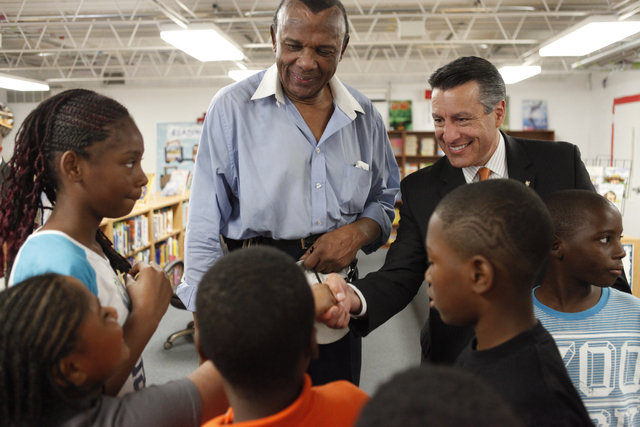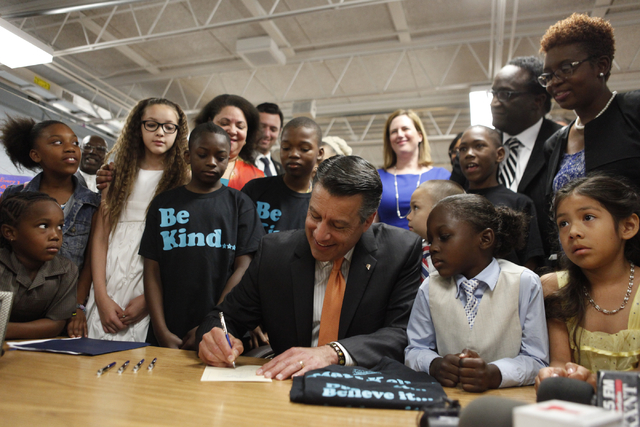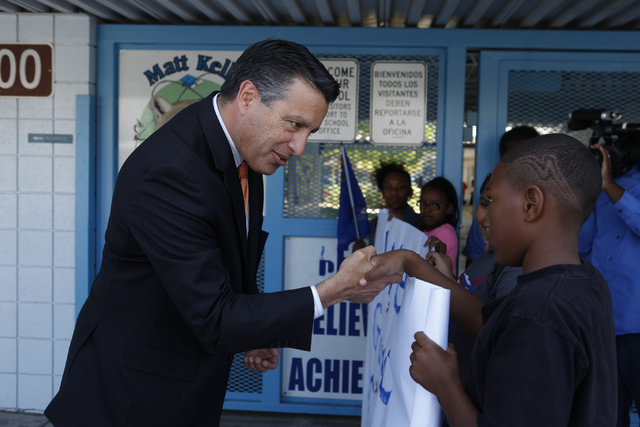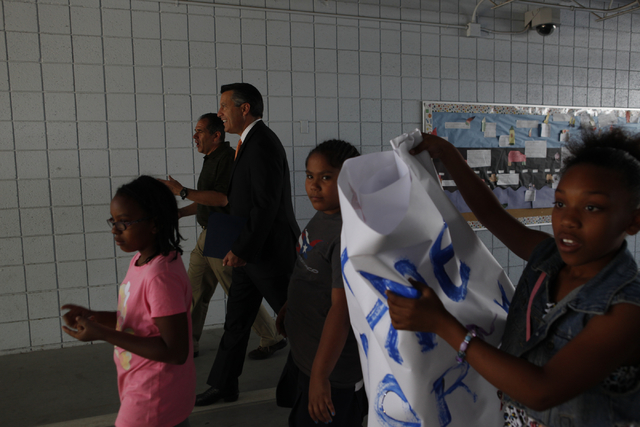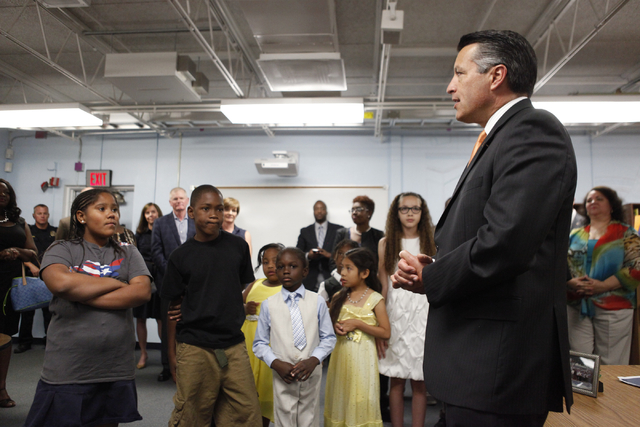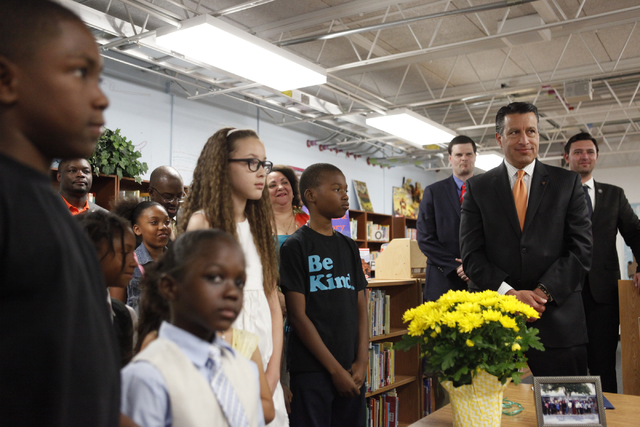Governor signs education bills, declares state ‘at the bottom no more’
CARSON CITY — Gov. Brian Sandoval’s many-pronged education spending and reform package approved by the just-concluded 2015 Legislature represents the most significant change to the public school system in 60 years.
Sandoval signed three of the measures into law Wednesday at three different Las Vegas elementary schools: A “Read by Three” measure, funding for English Language Learners in the Zoom Schools program and a new “Victory Schools” program to improve student performance at schools in high poverty areas.
The three measures will provide more than $100 million to schools for programs such as literacy, pre-kindergarten, English as a Second Language and professional development for teachers.
“We’re going to provide these children every opportunity,” Sandoval told an assembled crowd at Kelly Elementary School on J Street, south of Lake Mead Boulevard. “Nevada will be at the bottom no more.”
But the “education session” also produced more controversial measures, with school choice becoming law in Nevada, along with a measure seeking to break up the Clark County School District, that Senate Democrats complained was rammed through at the last minute.
In an interview Tuesday the day after the session ended, Sandoval said getting even one or two of his initiatives would have been a monumental achievement in a single session. So many initiatives winning approval is a huge success, he said.
“This is the education session,” Sandoval said. “Every child in the state will be touched.”
The list of new and expanding programs includes:
•$27 million for a new Read by Three program that will require third-graders to be reading proficient or be held back;
•Nearly $142 million to expand all-day kindergarten into every school in the state;
•First-ever state funding totalling $10 million for gifted and talented students;
•A statewide Achievement School District that could take over half a dozen of Nevada’s 78 failing schools and operate them as charters;
•$50 million in additional funding, for a total of $100 million, to help English Language Learners through the Zoom Schools program.
Bills will also strengthen Nevada’s charter schools, provide $15 million for a new teacher scholarship program and pay incentives to Nevada educators in hard-to-fill jobs, and create a new office with funding for social workers to combat bullying.
Sandoval said the inspiration for the scholarship bill was his daughter Maddy, who is considering a career as a teacher.
Sandoval praised Dale Erquiaga, his superintendent of public education, for developing and lobbying for the comprehensive education reform plan.
Erquiaga said the Legislature has accomplished something that has not been done since 1955 when the sales tax was created and lawmakers restructured the school system.
“They increased education spending and really started a brand new system for reform,” he said. “It really is a new Nevada. I can’t think of another time when there was so much reform and such an investment.”
The many programs have accountability measures to ensure the dollars are spent wisely and the successes can be measured, Erquiaga said.
Sen. Mo Denis, D-Las Vegas, became emotional when talking about Sandoval’s new revenue plan and the effect it will have on education in Nevada. Twenty-five years ago he volunteered with the PTA to help his daughter and her classmates.
“That goal to make things better for my kids, and of course I’ve had four other kids since then, it seems like it’s taken a long time to get to this point,” he said. “But this is a wonderful day. This is a day that makes all of the sacrifices … worth it.”
But Assemblyman Ira Hansen, R-Sparks, argued against much of the education plan, saying that past requests for funding came with promises of accountability that never materialized.
Joyce Haldeman, a lobbyist for the Clark County School District, said there are many good programs in the budget and bills that we’re passed.
“We’re excited to be able to expand all-day kindergarten to every child in Nevada,” she said. “We’re also excited about the expansion of Zoom schools.”
But the deconsolidation of the district is a concern, Haldeman said. The district would have preferred the proposal to come back to the 2017 Legislature. Instead, it will go to a smaller number of lawmakers who meet as the Legislative Commission.
“If the decision is made that we better serve kids with smaller districts, we’re not opposed to that,” Haldeman said. “What we are opposed to is rushing into it.”
The effect on the ability of the district to bond for new construction is also a concern, she said.
Without question the most controversial measures of the session have created school choice for the first time in Nevada. One will allow parents to obtain scholarships for their children to attend private schools, including religious schools, giving businesses that donate to scholarships a credit on their payroll taxes.
An even more controversial measure, signed into law by Sandoval on Tuesday, will provide grants for a child’s education that are 90 percent of the state’s average per-student funding. That money would go into an education savings account for the child. Under the measure, the state would oversee the spending by issuing the parents coded debit cards that can only be used for approved expenditures.
Called an illegal voucher program by critics, the measure is expected to be challenged in court.
Sandoval said the measure was vetted by the Legislature’s legal staff and deemed constitutional.
Assembly Bill 394, the school breakup bill, drew sharp criticism as it was rushed through the Senate in the final minutes of the session. After it was approved on a 13-7 vote, Senate Minority Leader Aaron Ford, D-Las Vegas, criticized Majority Leader Michael Roberson, R-Henderson, for not discussing the equity and bonding issues raised by the bill.
“You do not, at this hour, put forth such legislation that is going to negatively affect the people of our communities without giving us the opportunity to address the issues,” he said. “Shame on you.”
Finally, new school construction got a huge boost early in the session.
The law will result in construction beginning now on seven new “shovel ready” schools in the Clark County School District open in the fall of 2017. Five more new schools will be built to open in 2018 and more would follow. Rehabilitation of existing schools is part of the proposal as well.
Contact Knowles Adkisson at kadkisson@reviewjournal.com or 702-224-5529. Find him on Twitter: @knowlesadkisson. Contact Sean Whaley at swhaley@reviewjournal.com or 775-687-3900. Find him on Twitter: @seanw801.

RELATED STORIES
School bills: Some head to governor, others await legislative action
Governor gets bill to pay for tutoring, private schools
Assembly approves bill exempting high-earning school administrators from collective bargaining
Nevada Gov. Brian Sandoval signs anti-bullying legislation
Assembly rejects gender-based school restroom bill
Sandoval’s scholarship bill heads to Senate floor
See all of our coverage: 2015 Nevada Legislature.



